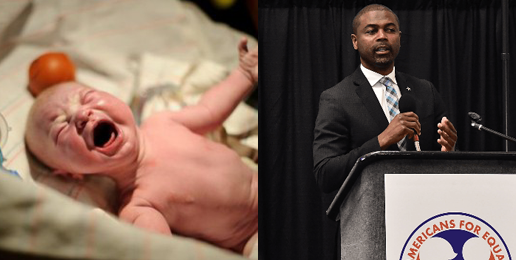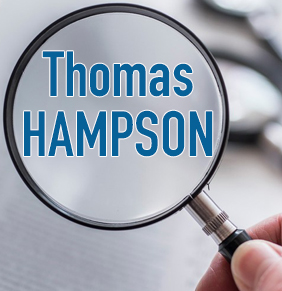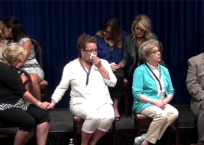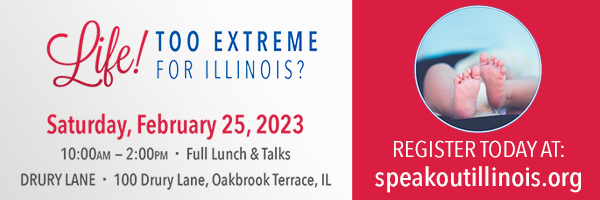
Is it in the best interest of the child to be raised by a mother who ingested so much alcohol or drugs that it affected the child’s fetal development?
If laboratory tests in a newborn show the presence of drugs in an infant’s blood, urine or other bodily fluids, or if the mother is intoxicated or has controlled substances in her blood prior to or immediately after delivery, forty-two states require that child protective services be notified. Illinois is one of the forty-two. In Illinois, controlled substances detected as present in the infant is considered, on its face, evidence of child neglect. Is this appropriate?
Illinois Representative LaShawn Ford (D-Chicago) does not think so. A bill he introduced for consideration this session of the General Assembly, HB 1468, would remove this provision in Illinois law.
Is Representative Ford right? Should a mother face criminal charges, or lose custody of her child, because she continued to drink alcohol or continued to consume heroin or other controlled substances knowing she was pregnant? Should the motivation of the mother be considered? If she was addicted as opposed to indifferent, should that factor in the decision?
Infants born with fetal alcohol syndrome or with heroin, fentanyl, meth, and many other controlled substances in their system, can face life-long severe problems. The Mayo Clinic lists the problems associated with fetal alcohol syndrome as follows:
“Physical Defects
“Physical defects may include:
- Distinctive facial features, including small eyes, an exceptionally thin upper lip, a short, upturned nose, and a smooth skin surface between the nose and upper lip
- Deformities of joints, limbs and fingers
- Slow physical growth before and after birth
- Vision difficulties or hearing problems
- Small head circumference and brain size
- Heart defects and problems with kidneys and bones
“Brain and Central Nervous Center
“Problems with the brain and central nervous system may include:
- Poor coordination or balance
- Intellectual disability, learning disorders and delayed development
- Poor memory
- Trouble with attention and with processing information
- Difficulty with reasoning and problem-solving
- Difficulty identifying consequences of choices
- Poor judgment skills
- Jitteriness or hyperactivity
- Rapidly changing moods
“Social and Behavioral Issues
“Problems in functioning, coping and interacting with others may include:
-
- Difficulty in school
- Trouble getting along with others
- Poor social skills
- Trouble adapting to change or switching from one task to another
- Problems with behavior and impulse control
- Poor concept of time
- Problems staying on task
- Difficulty planning or working toward a goal”
Many controlled substances reportedly have similar effects on the child. The key to the extent of the consequences to the child is how severe was the damage to the child’s neurological system. If the damage was minimal, the long term consequences to the child will depend on the environment in which he is raised.
Representative Ford partially addresses this. His bill requires the development of a family care plan and details what should be part of the care plan in the event a child is born to a mother who has abused alcohol or drugs. In addition the bill details how the care plan is to be implemented and monitored, what agencies are to be involved, and the collection and analysis of data about babies born affected by alcohol and drugs as well as the families of those children. Maybe this elaborate plan might, in theory, provide some benefit if the child has not suffered significant neurological damage. But what if the child has suffered damage? That remains unaddressed in Rep. Ford’s plan.
The thirty-four page bill goes into substantial detail on how these cases are to be handled. The Abused and Neglected Child Reporting Act and The Juvenile Court Act of 1987 are also amended by the bill. In both Acts, Representative Ford proposes to remove the provision that defines as neglected “any newborn infant whose blood, urine, or meconium contains any amount of a controlled substance . . . or a metabolite of a controlled substance . . .”
No more prima facie cases of neglect which simplifies criminal charges and streamlines actions to remove a child from the parent’s custody, or even terminate parental rights.
Why? Who benefits from this? Does the child benefit by keeping a dysfunctional family together? If the child has suffered brain and nerve damage, will a drug addled mother be able to provide even minimal care? The family care plan, if written, implemented, carried out and monitored might allow for a long term improvement in the family. Those are big “ifs” and at what cost if the plan does not work out the way intended? Keeping a child under the care of someone struggling to overcome addiction doesn’t seem to be the best for the child.
The Illinois Department of Children and Family Services already is overburdened by its caseload. How will the agency be able to carry out the extra demands this bill would impose?
Simply stated, it will not.
We do not need laws that are more complicated, that require more people and money. We need laws that simplify, that reduce costs. If a mother, knowing that alcohol or drugs can injure the child growing within her, she is either indifferent or addicted and incapable of self-control. In either case, she does not have the self-sacrificing quality it requires to be a parent. With personal discipline or outside intervention she may acquire that quality over time. But it takes time. The child cannot go into hibernation until the mother gets equipped. Moreover, a child born of an addicted mother has complications far beyond that of a normal child.
The bottom line is the State can’t fix the mother. The State can provide a mechanism to ease the mother’s effort to get treatment, and it can facilitate a foster care system to protect the child while giving the mother a chance to get well. As a last resort, the State can initiate and streamline termination of parental rights. But the State cannot micromanage the lives of individuals.
The best interest of the child is central to the decisions of Child Protective Services, Family Courts, educational institutions, child serving organizations of all kinds. It should be central to the laws involving children that are developed by our legislators. The child’s best interest is to be raised by a mother and father, in a loving home, preferably a home where Christ is at the center. House Bill 1468 does not advance the interest of any child. It ignores a serious health issue that must be addressed for the wellbeing of mother and child.
This bill, if passed, would put children at greater risk.
Take ACTION: Click HERE to ask your state lawmaker to oppose HB 1468. The many harms that addictions can cause to babies and their families are very real. These harms are serious and could lead to life-threatening illnesses. Urge your lawmaker to protect these babies and instead streamline the foster care and adoption process.

































